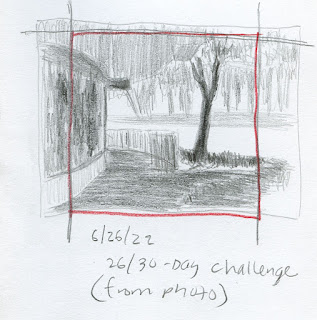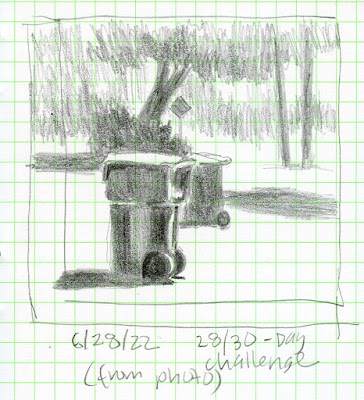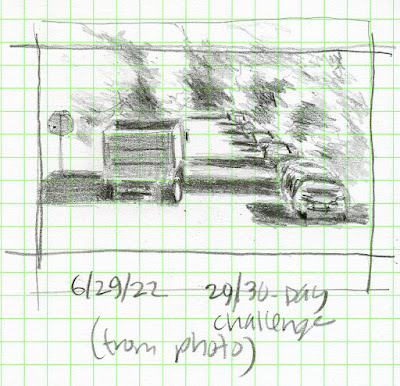 |
| 6/26/22 same scene from photo |
 |
| 6/24/22 Green Lake (from life) |
The final week of my 30-day compositional challenge resulted
in a couple of interesting observations. One afternoon at Green Lake, I made
two thumbnail studies from life (above left). I noticed and then became fixated on retaining
a tiny sliver of light on one side of a tree, which was otherwise silhouetted. I
took a few photos before I left the spot.
It’s very rare that I would draw the exact same scene from
both life and from a photo, so I wondered how different the experiences would
be. A couple days later, I made another thumbnail study, this time from a
photo (above right). Each experience had different benefits. From the photo, I was better
able to abstract the background because it’s slightly out of focus. But I could
barely see that sliver of light in the photo. Since I knew it was there, I
suppose I could have faked it. But if I hadn’t first drawn it from life and had
only snapped a photo, would I have even noticed that tiny bit of light? (This
question is the sketcher’s equivalent of whether a falling tree makes a sound
if no one is there to hear it.)
 |
| 6/28/22 from photo |
And speaking of observation, one study I made from a photo
seemed to take on a life of its own as a drawing, not just a thumbnail: the one
of trash cans (at left). Beyond capturing the shapes and values, I got interested in
rendering that slim crescent of light on the wheel and the unexpected reflected
light under the part of the trash can that protrudes slightly. I probably would
not have noticed those bits if I hadn’t made this composition study. Not
everything may be worthy as a drawing subject, but everything is worthy of the
close observation that drawing demands.
As you’ve likely gathered from my weekly reports, Ian Roberts’ 30-day challenge has been enormously instructive, illuminating and
rewarding, even in ways that I hadn’t expected. I automatically “see”
compositions wherever I look now. I don’t expect all my compositions to be
great just because I’ve focused on studying the topic for a month. But if a
sketch ends up going awry, I think I’m now much better able to identify what
went wrong. In fact, I’d be willing to bet that it’s a faulty composition – and
perhaps the real fault would be that I didn’t make a thumbnail study first! All
those books I read and instructors I heard (but didn’t listen to) were right: Taking
a few minutes to make a thumbnail first can save so much time and aggravation
later!
Most surprising was something that wasn’t even an objective
of the challenge: I gained an appreciation for the value of drawing from
photos. I even found a way to enjoy it (though it will never replace drawing
from life). I’m ruminating on more thoughts related to drawing from photos, to this
challenge specifically, and to art challenges in general . . . coming up in future
posts.
 |
| 6/25/22 Greenwood neighborhood |
 |
| 6/27/22 Green Lake |
 |
| 6/27/22 Green Lake |
 |
| 6/30/22 Gas Works Park |
 |
| Challenge completed! |











What interests me most with some of these sketches is how you crop some of them after they are done. If you were doing an actual sketch in color that wouldn't be possible. Glad you got so much out of this challenge.
ReplyDeleteThat was one of the most instructive steps in the process for me! Almost every composition seemed to look better if I cropped it more tightly.
Delete"Not everything may be worthy as a drawing subject, but everything is worthy of the close observation that drawing demands."
ReplyDeleteTina, you have summarized a profoundly satisfying approach to life.
~ David Miller
Thanks so much, David! That might be the single-most rewarding thing about drawing!
DeleteAfter almost 60 years of camera work I feel the same way about photography. Incidentally, the experience of looking at the world through an old-fashioned view camera in which the subject appears inverted can radically alter, and perhaps enhance, one's awareness of composition. (Hm, I wonder what happens if you look at your thumbnail sketch upside down?)
DeleteFollowing the advice of some instructors, I have turned drawings upside-down when I think something looks "off" but I can't figure out what!
DeleteYou nailed it. Your croppings always seem to provide a dramatic improvement. They show your focus without losing anything of the context.
ReplyDelete